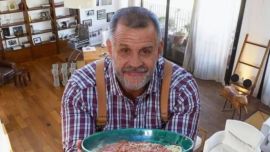President Sebastián Piñera on Monday strongly condemned the burning of two churches and other violence that marred anti-government demonstrations as Chile prepares to hold a landmark constitutional referendum.
Police said they had arrested nearly 600 people as a peaceful demonstration on Sunday to mark the anniversary of social protests descended into rioting and looting, including the burning of two Catholic churches in Santiago.
Piñera said tens of thousands of people had demonstrated peacefully, blaming "a minority of criminals who unleashed a wave of violence, looting and vandalism, including the burning of two churches of high historical and heritage value."
"This criminal action must be condemned by all of us who believe in democracy and want to live in peace," the conservative president said. "And we must condemn not only those who directly execute criminal violence, but also those who, in one way or another, promote, protect or justify it."
Police stations were attacked as the authorities recorded 107 serious incidents nationwide while rioting continued overnight, Interior Ministry Undersecretary Juan Francisco Galli told reporters.
Crunch referendum
The demonstration came just a week before Chileans vote in a referendum on whether to replace the dictatorship-era Constitution – one of the key demands when the protest movement began in October 2019.
Pinera, a billionaire businessman who has not publicly stated whether he supports approval or rejection of the proposed constitutional change, called for massive voter turnout for next Sunday's referendum.
Sunday's violence erupted after around 30,000 protesters flocked to Santiago's central Plaza Italia for a peaceful demonstration, the government said.
But as the afternoon wore on, clashes broke out on the periphery of the square, more than 300 meters from the main, peaceful, demonstration.
Galli said there was a "very clear distinction in how the day evolved" after it began with a peaceful demonstration but ended with serious acts of violence.
One church close to Plaza Italia was burned to the ground as hooded protesters cheered, while a second place of worship was looted and also suffered fire damage.
The small Church of the Assumption, which was destroyed in Sunday's violence, is known as the "artists' parish," according to local press. The building dated back to 1876.
Nationwide clashes
Clashes also occurred in other neighbourhoods of Santiago and in cities around the country, resulting in 580 arrests, 287 in the capital alone, Galli said.
There were clashes between groups of football hooligans in one Santiago neighbourhood, while protesters in Plaza Italia doused a statue with red paint.
The images of the blazing churches was a stark reminder of the months of violent protests that broke out in Santiago last October 18, initially over a rise in metro fares.
The unrest quickly broadened into protests against the country's stark inequalities and left some 30 dead and thousands wounded.
Demonstrators on Sunday also called for their countrymen to vote to "approve" the proposed constitutional change.
"This is the opportunity to say 'enough!' We're here and we're going to vote for 'Approve,'" Paulina Villarroel, a 29-year-old psychologist, told AFP.
On October 25, more than 14 million Chileans will decide whether to amend the Constitution.
The referendum to decide whether to change the Constitution established under the military rule of General Augusto Pinochet (1973-1990) was originally due to take place in April but had to be postponed as the country of 18 million reeled from the deadly coronavirus pandemic.
For those supporting a yes vote – notably the leftist opposition – a new constitution would allow for the establishment of a new and fairer social order in one of the Latin American countries most marked by economic and other forms of inequality.
by Paulina Abramovich, AFP
























Comments